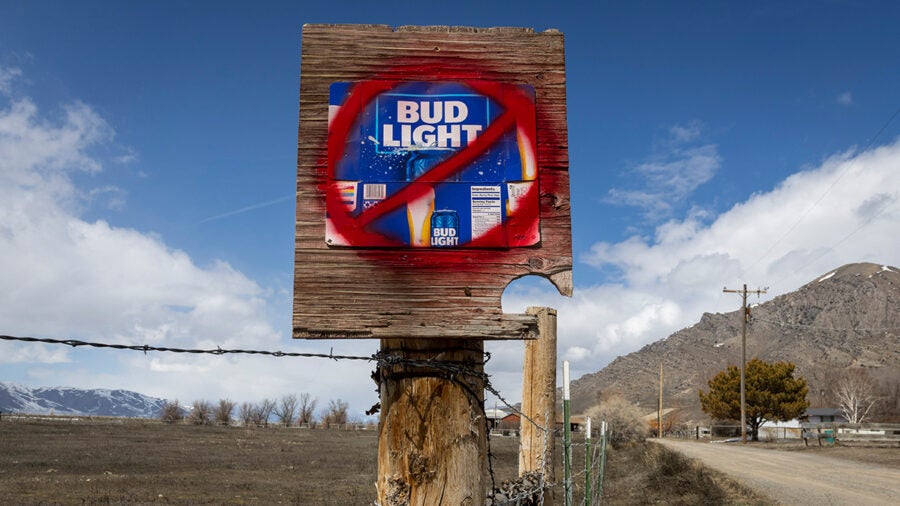
Bud Light has become the latest casualty of the culture wars. The US beer brand, owned by Belgian drinks conglomerate AB InBev, is facing a backlash from a section of consumers against a social media promotion by influencer Dylan Mulvaney, a comedian and actor who happens to be a trans woman.
After Mulvaney, who has documented her gender transition online, shared a video endorsing the low-calorie lager to her 2 million followers on Instagram, a number of right-wing commentators and celebrities began calling on their followers to boycott the brand.
That boycott appears to be working. According to data from Bump Williams Consulting and NielsenIQ reported by the New York Post, Bud Light’s sales in the US fell by 21.4% in April. Sales across other brands in the AB InBev portfolio have also taken a hit, with Budweiser revenue down 11.4% in the week ending 29 April and Michelob Ultra falling 4.4%.
The company’s CEO, Michel Doukeris, told investors on its first quarter earnings call that the decline in sales of the beer in the US in the first three weeks of April would represent around 1% of its total sales volume. That, he said, was “manageable” but is a striking impact.
The fallout has prompted AB InBev to place two senior marketing executives involved in the promotion on a leave of absence and restructure its marketing teams, so execs are ”more closely connected to every aspect of its brands” . The company then announced that it would be refocusing its marketing efforts on sports and music over the summer, with plans to triple media investment behind Bud Light.
Its response, however, is rooted in short-termism. Yes, the video has caused a furore among a sub-section of US consumers but in the long term bowing to prejudice against marginalised people cannot be the way forward.
Cultural expectations are changing
The trans ‘debate’, as it is often erroneously framed, is not a debate at all. Transgender people exist and have every right to drink, enjoy and endorse a beer if they wish to.
Similarly, consumers have a right not to drink it. But, if one considers the trajectory of cultural expectations, alongside evolving generational attitudes towards issues such as sexuality and ethnicity, it makes more sense for brands to position themselves as progressive, rather than labelling themselves as resistors of change.
We never intended to be part of a discussion that divides people
Responding to the social media furore that followed Mulvaney’s video, Brendan Whitworth, CEO of AB InBev subsidiary Anheuser-Busch, said: “We never intended to be part of a discussion that divides people. We are in the business of bringing people together over a beer.”
But the exact opposite has been achieved. In effect, AB InBev’s capitulation to the boycott has positioned Bud Light as a beer not meant for trans people or their allies.
AB InBev’s handling of this situation is even more puzzling when you consider that Whitworth acknowledged only last month in a podcast interview with Nines Living that there would be “no future for Bud Light” if it could not attract young drinkers.
Messaging matters
In an increasingly crowded market for light beer (lower in both alcohol and calories) aimed at more health-conscious millennials and gen Zers, Bud Light has several popular competitors, such as Coors Light or Estrella Galicia, so messaging really matters. Yet the decision on Mulvaney sends only the wrong message.
Whether AB InBev likes it or not, young people, along with their views and preferences, will shape every market, including that for light beer. The answer, then, should be not to acknowledge transphobic trolls on social media but to develop advertising campaigns with them in mind.
It’s not that young people are oversensitive. But they are ostensibly more sensitive than their elders to a world that’s changing around them. The most successful brands appreciate this and are adapting to it.
As an example of how to do this well, look to Nike. It found itself at the centre of a similar furore in 2018 when it included the NFL quarterback Colin Kaepernick in its 30th anniversary activity for the ‘Just Do It’ campaign. The company was both praised and criticised for including Kaepernick, who had ‘taken the knee’ by refusing to stand during the national anthem at the start of games in protest at racism and police brutality.
But, as the campaign was built and developed with its customers in mind, Nike stood its ground. And went on to see an uplift in both brand metrics and sales – and has since gone from strength to strength.
There are many who similarly praised Bud Light for its work with Mulvaney, but AB InBev has chosen not to listen to them. This is despite its previous work supporting the LGBTQ community, for example through sponsorship of Pride events and a partnership with GLAAD that saw it release rainbow-inspired bottles.
That support cannot only work when it suits the brand. AB InBev should rethink its strategy.

Bud Light has become the latest casualty of the culture wars. The US beer brand, owned by Belgian drinks conglomerate AB InBev, is facing a backlash from a section of consumers against a social media promotion by influencer Dylan Mulvaney, a comedian and actor who happens to be a trans woman.
After Mulvaney, who has documented her gender transition online, shared a video endorsing the low-calorie lager to her 2 million followers on Instagram, a number of right-wing commentators and celebrities began calling on their followers to boycott the brand.
That boycott appears to be working. According to data from Bump Williams Consulting and NielsenIQ reported by the New York Post, Bud Light’s sales in the US fell by 21.4% in April. Sales across other brands in the AB InBev portfolio have also taken a hit, with Budweiser revenue down 11.4% in the week ending 29 April and Michelob Ultra falling 4.4%.
